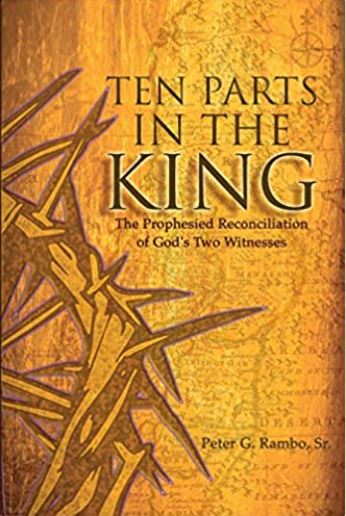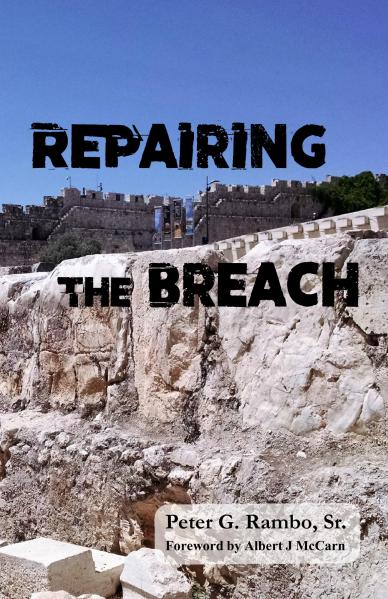A friend sent me a copy of an article from the late 1890s. While it is very interesting and telling, a citation from the Encyclopedia Britannica (doesn’t say which edition, but I guess circa early 1890s) really shakes up the ‘sola scriptura’ idea… But, this blog has said this before.
Here is a portion of the article:
Inconsistency of Reformers.
Thus the reformed churches, while professing to reject tradition for the pure Word of God, were led to deny their own position, by accepting Sunday on the authority of tradition only, and tradition directly opposed to the divine Word. It was the weakness caused by thus practically denying their own position that more than any other one thing arrested the progress of the Reformation. Draper says: “Toward the close of Luther’s life it seemed as if there was no other prospect for papal power than total ruin; yet at this day out of three hundred millions of Christians more than half owe allegiance to Rome. Almost as if by enchantment the Reformation suddenly ceased to advance. Rome was not only able to check its spread, but even to gain back a portion of what she had lost.”—Intellectual Development, vol. 2, page 216.
At the Council of Trent, called by the Roman Catholic Church to deal with questions arising out of the Reformation, it was at first an apparent possibility that the council would declare in favor of the reformed doctrines rather than against them, so profound was the impression made thus far by the speeches and writings of Luther and the other reformers. The pope’s legate actually wrote to him that there was “a strong tendency to set aside tradition altogether, and to make the Scripture the sole standard of appeal.” The question was debated day after day, until the council was fairly brought to a standstill. Finally the archbishop of Reggio turned the council against the Reformation by the following argument:—The Protestants claim to stand upon the written Word only. They profess to hold the Scripture alone as the standard of faith. They justify the revolt by the plea that the church has apostatized from the written Word and follows tradition. Now, the Protestants’ claim that they stand upon the written Word only is not true. Their profession of holding the Scripture alone as the standard of faith, is false. Proof: The written Word explicitly enjoins the observance of the seventh day as the Sabbath. They do not observe the seventh day, but reject it. If they do truly hold the Scripture alone as their standard, they would be observing the seventh day as is enjoined, in the Scripture throughout. Yet they not only reject the observance of the Sabbath enjoined in the written Word, but they have adopted and do practise the observance of Sunday, for which they have only the tradition of the church. Consequently, the claim of “Scripture alone as the standard,“ fails; and the doctrine of “Scripture and tradition as essential,” is fully established, the Protestants themselves being judges. (See the proceeding’s of the Council of Trent; Augsburg Confession; and “Encyclopedia Britannica,” article Trent, Council of.)
At this argument the party who had stood for Scripture alone, surrendered, and the council at once unanimously condemned Protestantism and the whole Reformation, and proceeded to enact stringent decrees to arrest its progress. It was by this means, and also by the denial of the other cardinal principle of the Reformation, the doctrine of soul liberty, by an appeal to force, that the glorious progress of truth was arrested as by a magic wand. Then the churches wrote their creeds, and so took the individual from the guidance of the Spirit, and delivered him over to the control and teaching of the organization, which must always be ultra conservative.
I used a similar argument against dividing the Law into three categories. (I was previously taught the Three-fold Division of the Law is the ‘gold standard’ of Protestant “wisdom.”)
Here is the quote from a private email I later redacted names from and posted on my blog:
Elsie,*(changed) in her paper on homosexuality, makes a significant observation: “(paraphrasing) Some homosexuals say that since parts of the Levitical law have been abrogated, then they have a right to declare parts dealing with their homosexuality also done away with.” Astute! And, a major indictment against any who would alter the law without clear Scriptural reason. I say, “No sacrifices because Scripture says it is unlawful without Levites and a Temple.” The one who divides the Law says, “No sacrifices because it seems to me that the Law is divided and that part is done away with” thus opening the door for any yahoo to divide the law to his/her own liking. Even Ross admits it is often hard to determine which category different laws fit in and therefore how they may/may not apply. Do we not do damage to our testimony by declaring parts of the Law to be annulled when scripture nowhere teaches such? By declaring laws abrogated do we not open the door for others to pick and choose according to their own proclivities? Is it not significantly stronger footing to understand them as suspended?
Sola Scriptura... yeah. Protestantism is ‘sola Scriptura’ as long as it doesn’t mess with their traditions… Traditions like pagan holidays, worship days, diet and dress… Things Scripture says are directly related to holiness.
Set tradition aside and find out what the Scriptures REALLY say. Test Everything!!
Shalom.




















































































































The speech at Trent doesn’t pass the smell test, and the article is obviously NOT of the tone and demeanor of Encyclopedia Britannica. The spelling booboo in “See the proceeding’s…” is further evidence that the article is an amateur fake.
In any case, however, it is not true that there is no Scripture warrant for the shift of Sabbath observance to the first day.
1 Cor 16:1 Now concerning the collection for the saints, as I have given order to the churches of Galatia, even so do ye. 2 Upon the first day of the week let every one of you lay by him in store, as God hath prospered him, that there be no gatherings when I come.
Acts 20:7 And upon the first day of the week, when the disciples came together to break bread, Paul preached unto them, ready to depart on the morrow; and continued his speech until midnight.
Moreover, that this was the apostolic example is further evidenced by the fact that, whatever practice they would have established, anyone that tried to change it would have created an immediate riot and there would be a record of it. Don’t forget: it wouldn’t be just a local change, but a universal one.
Look how much resistance there was to Jerome updating the translation of the Psalms, since these were used in worship. A fortiori, the day they would gather.
So the conclusion is unavoidable that the first-day practice was by authoritative apostolic example, and mentioned and ratified in the inspired epistles.
LikeLike
Tim,
Shalom and welcome. Thanks for dropping by.
At least part of this is an alleged quote from a book I cannot currently get my hands on. (Only $1700 dollars for a set on ebay right now…) The spelling error may be the transcriber’s, or it may be an undefined note on his/her part.
As to your two ‘first day’ citations, you will note that the Greek says, ‘mia tov sabbatov‘ and ‘mias sabbatou‘ in respective instances. Or, more literally, ‘one of the sabbaths.’
Bishop’s translation from the 1560’s says, “And vpon one of the Sabboth dayes, when the disciples came together for to breake bread, Paul reasoned with the, redy to depart on the morowe, and continued the worde vnto mydnyght.”
The more recent Apostolic Bible Polyglot says, “And onG1722 G1161 G3588 oneG1520 of theG3588 Sabbaths,G4521 [3having been gatheredG4863 1theG3588 2disciples]G3101 to breakG2806 bread,G740 G3588 PaulG* reasonedG1256 with them,G1473 being aboutG3195 to exitG1826 theG3588 next day;G1887 and he extendedG3905 G5037 theG3588 wordG3056 untilG3360 midnight.G3317″
The word ‘day’ does not appear, nor does the word ‘week.’
The only apostolic example, witnessed throughout the Book of Acts, is Sabbath keeping. Roughly 80 times.
Rav Sha’ul/Apostle Paul’s testimony of himself was, ‘(Acts 24:14) I do serve the God of our fathers, believing everything that is in accordance with the Law and that is written in the Prophets….(25:8) I have committed no offense either against the Law of the Jews or against the temple or against Caesar… (25:11) If, then, I am a wrongdoer and have committed anything worthy of death, I do not refuse to die; but if none of these things is of which these men accuse me, no one can hand me over to them… [Remember, breaking the Sabbath or even teaching an alternate day was punishable by death: Deuteronomy 12:32-13:1-5] … (28:17 & 18) I had done nothing against our people or the customs of our fathers…there was no ground for putting me to death.‘
If Sha’ul/Paul taught against the Sabbath, then his testimony here is a lie.
The short answer to Sabbath changing is this: Long before Israel came on the scene, the Sabbath was established. (Genesis 2:2-3) Speaking of a time yet future, Isaiah 66:23 says this: “…And it shall be from new moon to new moon and from sabbath to sabbath, all mankind will come bow down before Me,” says the Lord.
To read further, please consider: https://natsab.com/2013/01/28/the-sabbath-scripturally-speaking/
And, at least part of my story is here: https://natsab.com/2013/02/05/rt-antisemitism/
May the Lord bless you, Pete
LikeLike
Well my “middle Liddell” suggests sabbaton is to be translated “week.”
Apart from that, you still would have to account for how your conspirators could have pulled off a shift in the day of worship, universally throughout the world, and do so without leaving the smallest mark in history. It is not credible.
In any case, the OP is not about how to exegete sabbaton linguistically, but is a charge that the Reformers appealed to tradition rather than Scripture in this instance. This is not so. Luther believed that Scripture taught that the Sabbath was abolished with Christ, and that the church was now free to choose any day to assemble. There is no appeal to tradition there. Or more precisely: Luther saw nothing wrong with a tradition provided it was not contrary to Scripture and the law of Christ. So the alleged quote at Trent (which I will bet a Franklin is fraudulent — doesn’t smell right) would have been easily answered by the Lutherans, indeed, laughed off the stage.
Plus, if it HAD been the case the Scripture evidently taught that the church should worship on Saturday, what would have held the Reformers back from doing so? Especially, if the popish bluff could so easily be called?
Knox went much farther than Luther, upholding the Sabbath principle explicitly. Not only did he evidently believe the authoritative apostolic practice to have been Sunday worship, but the Reformed teach that the nub of the Sabbath principle is “1 in 7,” not so much “THIS 1 in 7.” Thus, the day can shift without destroying the sabbath principle, in their view. See my comments under “which of the seven days is Sabbath” at http://butler-harris.org/archives/1267. Again, say they were wrong if you want. That is quite different from proving that they were hinging it on unbiblical tradition.
It might very well be that instead of modeling the day as if synchronizing with the days of Creation (which therefore, as I think you conceded, has nothing to do with the Hebrews, but belongs to all humanity — thus the silliness of identifying any stance on this question as “antisemitic”), we should think of it as “the first day of Man,” emphasizing that grace/goodness precedes work. Then, the shift to Sunday is not so much a shift of the day of the week, as a shift of the Man — from the first day of the first Man Adam, to the first day of the second Adam, the son of God and the son of Man.
LikeLike
Tim,
There is not one single shred of evidence anywhere in Scripture that the Apostles or the new believers, Gentile or Jew ever worshiped on any day other than the seventh day Shabbat.
Luther begins with the false presupposition that the day was changed, then tries to back that into the Acts and Gospel accounts, but there is no evidence to support it. In fact, all evidence is contrary.
Creation: Genesis 2:2-3, Seventh day Sabbath.
Before Mt. Sinai: Exodus 16:22ff, Seventh day Sabbath. They knew what it was and Moses uses word first, not the Father.
After Mt. Sinai: Exodus 31:16-17, “So the sons of Israel shall observe the sabbath, to celebrate the sabbath throughout their generations as a perpetual covenant.’ 17 It is a sign between Me and the sons of Israel forever; for in six days the Lord made heaven and earth, but on the seventh day He ceased from labor, and was refreshed.”
Yeshua celebrated only on the Sabbath. Gospels.
The Apostles taught on the Sabbath: Acts.
In the future: Isaiah 66:16-23 (16 gives timeframe. 23 gives actions.)
The Apostles expected new Gentile believers to learn Moses (Torah) on the Sabbath in the Synagogue. Acts 15:21. It does not get any plainer than that.
The covenant with the Sabbath is an everlasting (olam) covenant, just like the rainbow. Cannot and will not change. Ever. See https://natsab.com/2013/01/23/rt-olam/
There is no prophecy that it would change. There is not even a hint in Scripture that it would or was changed.
I don’t follow Luther or Knox. They are fallible men. I am obedient to the Word of my King which is not fallible.
Now, more on the use of ‘sabbaton,’ in a paper my son wrote: https://natsab.com/2013/01/28/the-sabbath-scripturally-speaking/ He addresses Acts 20:7 and I Cor. 16:2. Have to be able to count the omer to understand what is happening in those two verses… The correct translation is ‘one of the Sabbaths,’ substantially more supportable from the Greek.
So, back to the original premise of the paper: Is Protestantism truly Sola Scriptura? Seven times in the Tanach we are explicitly told to keep the SEVENTH DAY kadosh. At least once we are told ‘forever’ and ‘perpetually’ in the same telling. Where is the prophecy of it changing? (Amos 3:7) Where is the change specifically articulated, contrary to the 60 odd mentions in Matthew – Acts?
Is Protestantism Sola Scriptura? The evidence says, “No!” (And there are other proofs using other items as well… Feasts of the Lord… To be celebrated ‘perpetually’ ‘in all your dwellings’ ‘throughout your generations?’ ‘Be ye holy by differentiating the clean and the unclean’… Yep, Protestantism and her mother the Roman Catholic Church ignore the breathed Word of God on those topics as well.)
Let the infallable Scriptures speak, not the fallible ‘fathers.’
Shalom!
LikeLike
Well Pete I like your son’s essay in one respect: that he doesn’t succumb to the jew-venerating (and I might add, highly arbitrary and inconsistent) language-corruption of the “messianic” movement. However, the historical treatment of Constantine and the East-West schism is quite inaccurate. The only way that Sunday played any role in the schism at all was the Easter question, and this did not touch on the weekly cult at all. Constantine was enforcing sabbath protection of the worker in view of the received practice of sabbath observation, not starting something new and arbitrary.
You can be sure that if Sunday-worship were imposed by Rome on the East by force, they would be howling about it to this day. There is simply no evidence for it, so you should stop saying it.
As far as the best way to translate the Greek, I will consult with the Greek scholars here at University of Georgia when the new semester starts in January, and get back to you on that. However, it seems glib to dismiss the entire array of numerous translations, dictionaries, and scholarly apparatus with such a wave of the hand.
Apart from that technical question, I think your confusion on the Protestant doctrine of sola scriptura is based on a simple equivocation. You are confusing the attribution of authority with correct exegesis. That is, if I affirm P on the basis of scripture, and then you show that scripture actually teaches ~P, that doesn’t mean I was lying about sola scriptura, it simply means my exegesis was wrong at that point.
Moreover, in Luther’s case at least, sola scriptura as he defined it did not mean disallowing all traditions. It meant the church could not IMPOSE any doctrine except on the basis of scripture. Imposing and allowing are two different things. Again, you are allowed to argue that he should not have ALLOWED anything not in Scripture, but that is a different argument from saying he was a “hypocrite” in affirming sola scriptura. A hypocrite is someone who professes or acts differently than he actually believes, and this no one could say about Luther.
One way the probably-fraudulent Trent quote could be corroborated would be by consulting Chemnitz, who wrote a multi-volume work on Trent, dealing with every bit of minutiae I’m quite sure.
LikeLike
I will pass your comments along to my son. I’m sure he will appreciate the feedback.
His choice of topics was a big one… And there are a lot of opinions and writings. In the end, he/we just want to honor Scripture.
I agree with your comments on Luther with ‘impose’ versus ‘allowed.’ The problem is he simply continued doing what Scripture does not allow. (Deu. 12:29-13:5)
Personally, my assessment of the Reformers is that they didn’t go far enough. The got out of the Roman Catholic Church but never got all of the RCC out of them.
As to Constantine and the Roman Bishops at his time… Why did the Council of Nicea need to address Sabbath keeping with several of their canons? Must have still been going on.
Historically, why were there still Sabbath keeping believers in Messiah around Jerusalem nearly 400 years after Yeshua? In fact, why has there always been a remnant of Sabbath keepers?
Back to what I previously said, ‘There is no evidence in Scripture, whatsoever, of a change of the day of rest.’ We have to use eisegesis to make that work. We’ve been doing it so long that it is the paradigm from which we think and simple logical reading of Scripture stands it on its head… But few will allow themselves to see it. It is too hard to stop and ponder the implications.
Scripture says what Scripture says. ‘…it is a covenant sign forever.’ So is the rainbow. Do we expect a flood, or not?
Blessings in your study. Shalom.
LikeLike
Pingback: Westminster Confession Errors, Pt. 1 | natsab